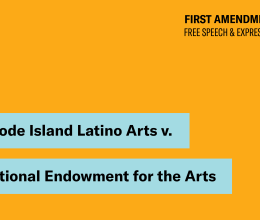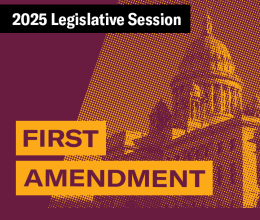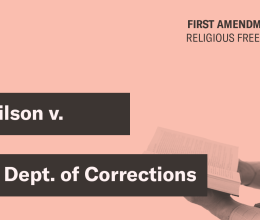In an attempt to avert implementation of a policy that the ACLU of Rhode Island argued would encourage censorship efforts, the organization sent a letter today to Glocester school district Superintendent Renee Palazzo, urging her to rescind directives she issued to the Fogarty Memorial School’s librarians to allow students to check out only “age appropriate” books.
The letter responds to a controversy over the circulation of books at the school district’s elementary school library. After a parent of a student complained that her son had taken out a book that she considered to be age-inappropriate for him, Superintendent Palazzo instructed the school librarians to “work towards ensuring students are checking out age appropriate books” and to “work with [a software cataloging system] to identify a way to group your inventory by age.” The ACLU letter said that these directives “establish a troubling precedent that can send a chilling message, encouraging censorship efforts that undermine basic pedagogical values.”
Specifically, the letter argued that imposing these requirements would “create innumerable practical and policy problems for librarians seeking to abide by and uphold their professional standards and, perhaps more importantly, they impose arbitrary and artificial barriers for children seeking to expand their horizons and read challenging books.” The ACLU letter said that requiring librarians to limit children to checking out only “age-appropriate” books was an “impossible” task:
While publishers may often suggest a recommended age range for any particular book, it remains just that – a range and a recommendation. It can’t be anything more than that in light of the extremely varied reading, comprehension, and experiential level of children. Parents themselves will have widely divergent views on what is appropriate reading material for their children, and it is unmanageable to give this supervisory and determinant role to librarians. Indeed, it is completely contrary to their mission as librarians – and to the mission of a school library. It would be even more inappropriate to assign such a task to other public employees or officials.
Acknowledging that parents have a right to monitor their own child’s reading habits, the letter pointed out that the school librarians had “no objection to accommodating parents who advise them of books – whether by title, genre, or recommended reading level – they do not want their children to take out,” and had also “offered to share with parents a link to the library’s book collection and make them aware of their ability to flag books they do not wish their children to bring home.” But, the letter warned, “anything that goes beyond this individualized approach, and that seeks to impose broad standards that affect the ability of all other children to read certain
books, does a disservice to the First Amendment, other parents’ rights, and, just as crucially, to the goal of any school in encouraging curiosity and vibrant reading habits in their students.”
This is not the first instance in recent years of Rhode Island librarians facing challenges to their curation work. Last year, a Westerly librarian faced an unsuccessful attempt to charge her with violating the state’s felony obscenity law for refusing to remove an award-winning LGBTQ book from the school library.





